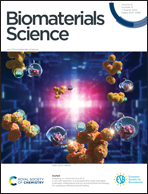One-pot fabrication of a polydopamine-based nanoplatform for GSH triggered trimodal ROS-amplification for cancer therapy†
Abstract
Reactive oxygen species (ROS) based nanoplatforms have been considered as attractive and feasible candidates for cancer therapy. However, the activated endogenous antioxidant defense of cancer cells in response to the ROS attack greatly hinders their therapeutic efficacy. Although cancer-specific ROS amplification strategies have been widely explored, most of them suffer from tedious synthesis procedures and complex components, which will bring about undesired side effects and unsatisfactory results. Herein, we design a cancer-specific oxidative stress amplification nanomedicine (CA–Cu–PDA), which is simply fabricated through integrating the glutathione (GSH) responsive/depleting nanocarrier of copper–polydopamine (Cu–PDA) nanoparticles with a ROS-generating drug cinnamaldehyde (CA) via a facile one-pot polymerization route. It is verified that GSH could trigger the breakage of CA–Cu–PDA networks and the subsequent release of both copper ions and CA in cancer cells. The released copper ions efficiently oxidize GSH, thereby weakening the antioxidant system of cancer cells and increasing the ROS levels. On the other hand, extra ROS are generated by the reduced copper ions through a Fenton reaction, so that a synergistic ROS therapy with CA is achieved. Consequently, oxidative stress is specifically increased within cancer cells, leading to efficient cancer cell apoptosis, significant tumor suppression and minimized side effects. Such an ingenious structure realizes the interlocking cooperation and full utilization of each component's function, presenting promising perspectives for nanomedicine design.



 Please wait while we load your content...
Please wait while we load your content...